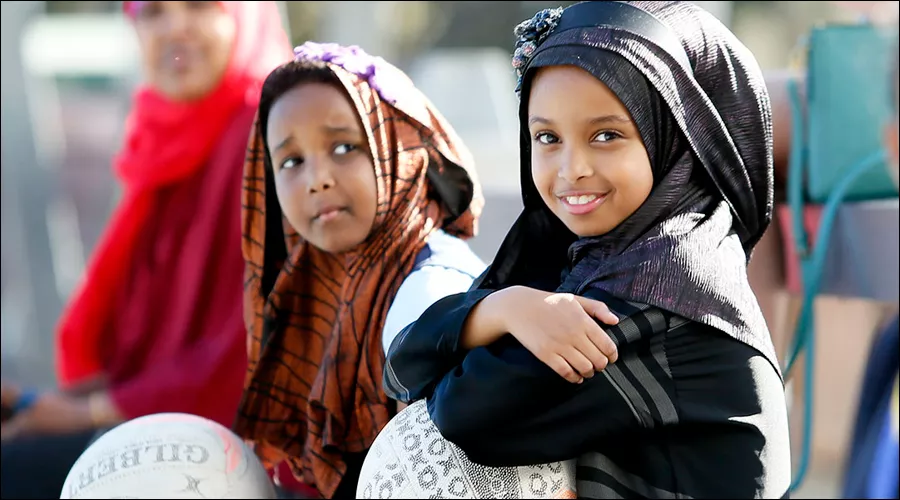Once each non-Covid Super Netball season, a group of about 100 players and their families from the Kensington Junior Netball Club attend a Melbourne Vixens home game. One afternoon, about three years ago, what is a reliably special outing was particularly memorable.
First, some context. A multi-cultural club that had started with one NetSetGO group at the local primary school in 2013 now has 15 teams, involving many disadvantaged children from immigrant families living in the local public housing estates.
So it was that on this annual trip to Melbourne Arena, with several mums from culturally and linguistically diverse backgrounds attending their first club event, Malawian star Mwai Kumwenda and Jamaican defender Kadie-Ann Dehaney ran out on court for a warm-up that prompted an unusual reaction.
“I will never forget the moment where one of the mums turned to the other and said ‘oh, my goodness, look, look, look, she’s just like us!’,’’ KJNC secretary Michelle Foster recalls.
“It was that whole thing that you’ve got to see it to be it. We’d brought them along to the game, but we weren’t just showing them a game that’s exclusive or for kids from a certain cultural background; their kids were effectively represented there.
“Of course, we may never have any of our kids go on to be a Vixen, but there was just this wonderful sense that not only were they there with us at the Vixens game and had come to a club event, which was so special anyway, but there was such a celebration of the game and diversity.
“So in some ways it’s a message to Netball Victoria about how important that is.’’
The follow-up came a year later in the form of a visit from Kumwenda and Dehaney to the KJNC to meet the junior players. Their rapt audience of young netballers included about 20 per cent from migrant backgrounds - many from African countries such as Somalia, Sudan and Ethiopia.
“Mwai and Kadie-Ann were just mobbed, and they were just wonderful,’’ says Foster, who recalls the Vixens’ pair graciously answering questions, posing for photos, and featuring in a story for the local paper.
Fast forward two years, and there is now some feel-good news of another kind for the inner-Melbourne club, through its success in the RACV Inclusive Community category at the 2020 Netball Victoria Community Awards.
Its philosophy is to ask: what are the barriers to inclusivity in netball and how can they be overcome? Consultation and consideration have helped to identify the reservations and concerns of potential participants and the best ways to address them.
But not everything has been so deliberate. Foster says that, back in 2013, hosting the initial NetSetGO program on the courts at Kensington Primary proved to be an unwitting masterstroke.
“We started it there for practical reasons, but it turned out to be crucial because by being in the playground after school we were visible, and I think for a lot of these families, participation in sport isn’t necessarily something that’s front of mind - and netball in particular,’’ she says.
“It might be that netball wasn’t part of their childhood, so it might be a new sport for a lot of families. We still had to work with families to think about how we could make it accessible for them. So that’s everything from assisting with dropping kids home after training, transporting them to the games on the weekend, thinking about subsidies for memberships, and essentially providing free uniforms.’’
Related cultural considerations include explaining the option of wearing t-shirts and tights under the standard sleeveless shift dress for modesty reasons, although the Muslim head-covering, the hijab, is perhaps the best example. The KJNC ordered stocks of an exercise-friendly design in team colours and provided them on a loan basis at no cost.
It was not just about practicality and comfort, but helping those wearing the hijab to blend in, according to Foster. “We wanted to reduce the sense that the girls might feel they’re standing out in some way. And just seeing them out on the court in the blue uniforms and the blue hijabs all matching has been fantastic.’’
Invaluable assistance has been provided by The Venny, a local community group working with at-risk young people to access funding to support their participation in sport. The partnership supports families from non-English speaking backgrounds navigate the registration process and provides drop off and pick up support for training sessions, while personal familiarity also helps with understanding.
Foster has witnessed more broadly how netball has helped to unite the local community, with integration at school level not necessarily translating to extra-curricular activities.
Coronavirus provided an unwelcome and more unusual complication in 2020, of course, but the KJNC's commitment to keeping players engaged during lockdown was rewarded with an attrition rate of less than 10 per cent when all 15 teams returned for the mini-season that finally started in Parkville in November.
With it, something a little closer to normality returned at last, too. As Foster says: “A few of us have seven-seaters, and every Saturday morning we load up the netball bus and off we go.’’ On what, over the past seven years, has been a hugely worthwhile journey.
RACV's General Manager Social Impact & Corporate Communications, Louise Steinfort, congratulates Kensington Junior Netball Club and secretary Michelle Foster on their contribution and devotion to providing netball within their community.
"RACV is proud to support Netball Victoria and work together on grassroots netball programs that help to connect communities through sport and provide better access for Aboriginal Australians, CALD and LGBTI+ communities to participate in netball across Victoria.
"Congratulations to the Kensington Junior Netball Club, the well-deserved recipient of the Inclusive Netball Community of the Year."
Written by Linda Pearce
